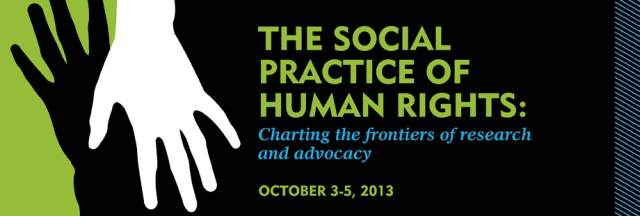Location
River Campus, Room M2006
Start Date
10-4-2013 1:00 PM
Abstract
Climate change poses a global threat to human security on an unprecedented scale. The international community has failed to effectively confront this threat, directing efforts primarily to mitigation of climate change drivers rather than adaptation and resilience. This is not due to a lack of concern, per say, but rather the fact that the tools, expertise and experience of states and international institutions are inadequate to address this threat.
Traditionally, states and international institutions have employed a top-down and state-centric approach to security. Due to drastically differing vulnerabilities all throughout the world, a bottom-up approach is necessary for the effective prevention of human insecurity stemming from climate change.
A bottom-up approach also happens to be the foundation upon which modern civil society was built. However, to date, the voice of civil society, particularly non-governmental organizations (NGOs) with a human security mandate, have been relatively absent from the international dialogue on climate change. This is due greatly in part to divergent approaches to human security within civil society, including a human protection approach and a human development approach. However, within the context of climate change, human security impacts bridge both approaches, specifically in regards to implications for survival, including water and food security, migration and conflict. In order for humanitarian organizations to uphold their ultimate mandate of prevention, there must be a convergence of approaches to human security within civil society to allow for insertion into international dialogue. The tools, knowledge and expertise of human security NGOs can serve to bridge the missing link in the international community’s approach to climate change. As climate change is a relatively slow process, civil society still has time to uphold their mandate of prevention, but the time to act is now.
This policy paper will argue that the prevention of human insecurity stemming from the impacts of climate change is still within reach but the time is now, as vulnerable populations are already being negatively impacted. In order for this to occur, the divergent approaches to human security within civil society must converge through realization of mutual concerns stemming from climate change. Civil society, the missing link in international dialogue on human security impacts of climate change, must interject itself in the international arena to foster cooperation between international institutions, states and humanitarian organizations.
Previous Versions
Deconstructing Prevention: The Missing Link in the Human Security Approach to Climate Change.
River Campus, Room M2006
Climate change poses a global threat to human security on an unprecedented scale. The international community has failed to effectively confront this threat, directing efforts primarily to mitigation of climate change drivers rather than adaptation and resilience. This is not due to a lack of concern, per say, but rather the fact that the tools, expertise and experience of states and international institutions are inadequate to address this threat.
Traditionally, states and international institutions have employed a top-down and state-centric approach to security. Due to drastically differing vulnerabilities all throughout the world, a bottom-up approach is necessary for the effective prevention of human insecurity stemming from climate change.
A bottom-up approach also happens to be the foundation upon which modern civil society was built. However, to date, the voice of civil society, particularly non-governmental organizations (NGOs) with a human security mandate, have been relatively absent from the international dialogue on climate change. This is due greatly in part to divergent approaches to human security within civil society, including a human protection approach and a human development approach. However, within the context of climate change, human security impacts bridge both approaches, specifically in regards to implications for survival, including water and food security, migration and conflict. In order for humanitarian organizations to uphold their ultimate mandate of prevention, there must be a convergence of approaches to human security within civil society to allow for insertion into international dialogue. The tools, knowledge and expertise of human security NGOs can serve to bridge the missing link in the international community’s approach to climate change. As climate change is a relatively slow process, civil society still has time to uphold their mandate of prevention, but the time to act is now.
This policy paper will argue that the prevention of human insecurity stemming from the impacts of climate change is still within reach but the time is now, as vulnerable populations are already being negatively impacted. In order for this to occur, the divergent approaches to human security within civil society must converge through realization of mutual concerns stemming from climate change. Civil society, the missing link in international dialogue on human security impacts of climate change, must interject itself in the international arena to foster cooperation between international institutions, states and humanitarian organizations.




Comments
This biennial conference provides a unique space for scholars, practitioners and advocates to engage in collaboration, dialogue and critical analysis of human rights advocacy — locally and globally. Learn more about the Human Rights Center at the University of Dayton >>>.